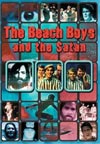The Beach Boys And The Satan
No one would dare accuse Brian Wilson and The Beach Boys of occult activities and Satanism. Say what you will about the downward spiral of Wilson and his bandmates during the turbulent sixties, but the devil didn't make them do it. The story of Brian Wilson is more difficult to explain than simply relegating him as a formerly acid-strung, bed-addicted fallen star.
Sure, the man sent himself on a pitiable itinerary of self-destruction, but as a widely-recognized musical genius, Brian Wilson's collision course with drugs was the direct result of peer pressure. It wasn't bluntly obvious, but it was found in Wilson's burning desire to keep pace with his fellow icons of the day, namely The Beatles. For their beautiful rock classic "Sgt. Peppers Lonely Hearts Club Band," there was already The Beach Boys' "Pet Sounds." Yet "Sgt. Peppers" is considered a halcyon recording that was instantly acknowledged due to The Beatles' overwhelming fame that allowed them to transcend from pop stars to songwriting sages ala "Rubber Soul" and "Revolver." In response, Brian Wilson has admitted numerous times the frustration of trying to move forward from his own band's post-adolescent surf shack tormented him beyond words.
Add to the nuisance of playing "Pet Sounds" for Paul McCartney and then seeing his brilliance inspire an already great songwriter in his own right, exacerbated by rejection from family and colleagues, and it's plain why Brian Wilson fell into the miasma of his own clouded head. No doubt Wilson felt fundamentally robbed at this point in his career, despite writing a timeless album that has only recently begun to receive genuine appreciation, given the fact The Beach Boys' primary demographic to this day still only want to hear "Surfin' USA," "Surfer Girl," "Fun Fun Fun," "Barbara Ann" and "I Get Around."
Keep in mind Wilson and his brothers were physically abused by their father, and nobody was in his corner by the time his creative pinnacle cost The Beach Boys' commercial appeal with "Pet Sounds" and the previously-unfinished "Smile." Perhaps then one might appreciate better the dark fugue Wilson submerged himself into.
"The Beach Boys and The Satan" is an anomaly in title because it implies that The Beach Boys, particularly Brian Wilson, sold their souls in exchange for a career's worth of memorable songs that were the lone holdouts for traditional American rock 'n roll when The British Invasion was the mod-lovin' rage. No, in this 1997 German documentary from Christoph Dreher's "Pop Odyssee" series, "The Satan" is dramatically referring to one Charles Manson.
The only real connection between The Beach Boys and Manson—aside from the carefree California sixties world both dwelled in—is the brief interaction between Manson and late Beach Boys drummer Dennis Wilson. Fact of the matter is, their association is so limited per history, the documentary would be 45 minutes less if singularly focused on this point. Manson had reportedly sent underground actor Bobby Beausoleil (who starred in Kenneth Anger's "Lucifer Rising") to Dennis Wilson's house with numerous girls in the interest of opening relations, presumably for Manson's musical aspirations. Dennis Wilson broke off ties, Beausoleil became one of the Manson Family's first murderers, and the infamous Spahn Ranch gestated the hateful Tate murders and thus set a precedent for modern crime.
For Dreher to imply any further correlation between The Beach Boys and Charles Manson is suspicious, and "The Beach Boys and The Satan" hardly plays out thus. In some ways, this is two documentaries crammed into one, as Dreher mostly weaves a crash course in Beach Boys history, along with more recent interview footage with Brian Wilson. You see where Dreher is leading to by the time he introduces Manson into his strangely-twined story but really, the merging of the two is perverse and grossly melodramatic.
Sure, one can include both figures as part of a psychedelic scene that went wrong, considering Dreher meticulously sets up the sixties period with flash-cut footage of Janis Joplin and Jimi Hendrix, not to mention the hippie counterculture at-large. From a music standpoint, Dreher does a commendable job in spinning the atmosphere that drove Brian Wilson as an artist conveying the façade of cool while obviously pining through deep agony within. Just listening to him relegate his own everlasting music in deference to Phil Spector and The Ronettes' punchy R&B hit "Be My Baby" reveals how anguished Wilson must've been on a daily basis, and the documentary wastes no effort to accentuate by pointing out Brian Wilson's drug-induced idiosyncrasies during the original "Smile" sessions. It also makes the 2004 re-recording and completion of "Smile" all the more triumphant.
"The Beach Boys and The Satan" also features interview segments with Kim Fowley, who sings out his forebodingly humorous narrative spots as a witness of the times. Producer Bob Was also checks in and helps shed some light on Brian Wilson's delineated thought process as a songwriter during such a crucial point of his life when he was forced to bear the death of his brother and further rejection from his father.
At the end of the day, this unconventional documentary is compelling enough on its musical duckets. However, bringing in Charles Manson and a horrifying looksee at the seldom-viewed Tate Massacre cadaver photos is a bit disrespectful to all parties affected. Bad enough Brian Wilson is the butt end of an unkind ditty by Barenaked Ladies; to talk about a classic like "Pet Sounds" in the same context as Charlie Manson is almost insufferable…







